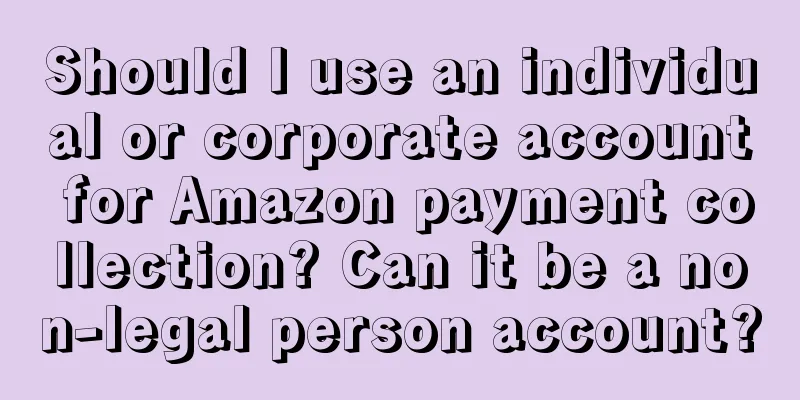Should I use an individual or corporate account for Amazon payment collection? Can it be a non-legal person account?

|
Whether the Amazon payment account is used by an individual or a company, and whether it needs to be a legal person, involves different situations and needs. Let us introduce it in detail below. 1. Should I use an individual or corporate account for Amazon payment? First of all, Amazon provides two types of payment accounts: personal account and business account. Which account you choose to use depends on your business model and needs. 1. Personal account Individual accounts are suitable for individual sellers and small-scale operators. Using an individual account can quickly start selling products on Amazon without providing company information or going through additional registration processes. Individual accounts usually have lower fees, but there are also some restrictions, such as a monthly sales cap and some feature limitations. 2. Corporate Account Corporate accounts are for officially registered businesses or organizations. Using a corporate account requires providing company information and relevant documents to verify your corporate identity. Corporate accounts usually have higher sales limits and provide more features and tools, such as bulk product uploads, customized reports, etc. In addition, a corporate account can provide more exposure opportunities for your brand and corporate image. 2. Can Amazon's payment account be a non-legal person account? In some countries and regions, only legal persons can register business accounts to ensure the legitimacy and identity authentication of the enterprise. However, Amazon also allows non-legal entities to register business accounts in certain circumstances, such as cooperatives or organizations. For specific requirements and feasibility, please consult local relevant institutions or professionals. Whether you choose a personal account or a business account, it is important to ensure that your account is legal, complies with Amazon's regulations, and meets local tax and legal requirements. Before registering an account, it is recommended that you learn about local laws and regulations in detail and consult professionals to ensure that your business operations are legal and smooth. In summary, Amazon provides personal accounts and corporate accounts for sellers to choose from. Which account to choose depends on your business model and needs, and whether you need to be a legal person depends on local laws and regulations. |
<<: How does Amazon charge a collection fee? Fee Standards
>>: What are the characteristics of cross-border third-party payment platforms? Is it convenient?
Recommend
What should I do if I cannot log into the eBay client on my mobile phone? What is the reason why I cannot log into my eBay account?
As one of the world's largest online shopping ...
Is it reliable to pay for registering on Amazon? How to register?
Amazon is developing very well now. Many friends a...
How to change the price of Shein products? What is the appropriate price?
As a world-renowned fashion e-commerce platform, S...
How does Amazon test products? Introduction to Amazon's testing methods
No matter whether you choose domestic e-commerce o...
Will Shopee's cross-border business account be blocked? What should I do if Shopee stops accepting orders after placing a few orders?
With the continuous improvement of platform rules ...
How to do SEO optimization when building a foreign trade website? What should you pay attention to?
SEO optimization is also a long-term job. Therefor...
What are the payment risks of cross-border e-commerce? How to reduce the risks?
With the continuous development of global trade an...
Is Shopee a scam? Is it a pyramid scheme?
Currently, you do not need to pay platform usage f...
Amazon India launches Sale Event Planner tool to help merchants plan events
Amazon India recently announced the launch of a ne...
It is easy to promote products, but difficult to promote products online. This is an inevitable problem for Xiaohongshu.
This article explains why Xiaohongshu is suitable ...
How many chances does Amazon have to pass the video verification? What are the precautions for video verification?
Generally, Amazon video verification is triggered ...
Top 10 trends in marketing
Marketing is showing many innovative strategies, f...
How to efficiently attract users in the infant formula market? Tips on how to effectively create content on Xiaohongshu!
How much do you know about the infant formula mark...
The secret of long-term brand sales
Whether it is a small brand or a big brand, only b...
Gansu Malatang's popularity review: Zibo copied the homework well, and it is bound to be rich
Recently, Gansu Tianshui Malatang has become popul...









